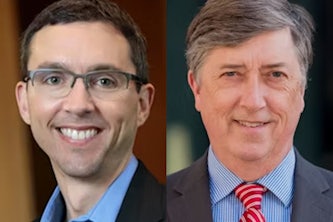
Randall Martin
Energy, Environmental & Chemical Engineering
- Phone
314-935-2183 - Office
Green Hall, Room 3120C - Lab location
Green 3101
Education
PhD and MS, engineering sciences, Harvard UniversityMSc, environmental change and management, Oxford University
BS, electrical engineering, Cornell University
Expertise
Leading expert on advancing the understanding of atmospheric composition
Research
Martin's research focuses on characterizing atmospheric composition to inform effective policies surrounding major environmental and public health challenges ranging from air quality to climate change. He leads a research group at the interface of satellite remote sensing and global modeling, with applications that include population exposure for health studies, top-down constraints on emissions, and analysis of processes that affect atmospheric composition. He leads an open-source global community model of atmospheric composition (GEOS-Chem), leads a global fine particulate matter network (SPARTAN) to evaluate and enhance satellite-based estimates of fine particulate matter, and serves on multiple science teams for satellite instruments including MAIA, TEMPO, MODIS-VIIRS Atmosphere, GEMS, and ACX. Data from his group are relied upon for a large number of assessments including the OECD Regional Well-Being Index, for World Health Organization estimates of global mortality due to fine particulate matter, for the Global Burden of Disease Project to examine the risk factors affecting global public health, for the Air Quality Life Index, and for a wide range of health studies.
Biography
Martin joined EECE in 2019 from Dalhousie University in Halifax, Nova Scotia, Canada, where he had been on the faculty since 2003. He was named professor in 2011 and Arthur B. McDonald Chair of Research Excellence in 2016. Over 2003-2019, he was a research associate at the Harvard-Smithsonian Center for Astrophysics. He serves on a variety of task forces, advisory boards and working groups as an expert on air quality. His professional honors include an Outstanding Faculty Award by the WashU Graduate Student Senate, an Atmospheric Sciences Ascent Award by the American Geophysical Union, being annually named a Highly Cited Researcher by the Web of Science since 2019, and being recognized by Research.com in 2022 as one of the top 25 environmental scientists worldwide.
Affiliations



